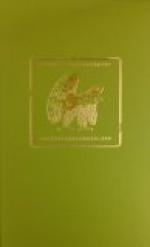A soft breeze came down over the ridge as they ascended; the flume, that followed the contour of the roadway, gurgled pleasantly. Everywhere along the spillways alfalfa spread thriftily, or strawberry plants sent out new tendrils. All growing things were more advanced in that walled pocket than in the outer vale; the arid gulf had become a vast greenhouse. Cerberus no longer menaced. Even the habitation of the goat-woman, that had been the central distraction of the melancholy picture, was obliterated. In all that charming landscape there was no discordant note to break the harmony.
The car doubled the curve at the top of the bench and ran smoothly between breadths of green lawn, bordered by nodding narcissus, towards the house, which was long and low, with a tiled roof and cream-colored walls that enclosed a patio. A silence fell over the company. As they alighted, every one waited, looking expectantly at Beatriz Weatherbee. The music of a fountain fluted from the court, and she went forward, listening. Her face was no longer inscrutable; it shone with a kind of inner illumination. But when she saw the slender column of spray and the sparkling basin, with a few semi-tropical plants grouped on the curb, a cactus, a feathery palm in a quaint stone pot, she turned, and her eyes sought Elizabeth’s. “It is all like the old hacienda where grandfather was born, and mother, and”— her voice broke—“Only that had adobe walls,” she finished. “It is like— coming home.”
“It is simply marvelous,” replied Elizabeth, and she added abruptly, looking at the prospector: “Mr. Banks, you are a problem beyond me.”
“It looks all right, doesn’t it?” the little man beamed. “Likely it would about suit Dave. And I was able to stand the investment. My, yes, now your brother has bought out the Annabel, what I spent wouldn’t cut any figure. But,” and his glance moved to the woman who had profited by the venture, “I’ll likely get my money back.”
Afterwards, when the party had inspected the reservoirs and upper flumes, Beatriz found herself returning to the bench with Lucky Banks. It was almost sunset, and the far Chelan peaks were touched with Alpine fire; below them an amethyst mist filtered over the transformed vale. They had been discussing the architecture of the building.
“I had often gone over the map of the project with David,” she said, “but he must have drawn the plans of the house later, in Alaska. It was a complete surprise. I wonder he remembered the old hacienda so accurately; he was there only once—when we were on our wedding journey.”
“There were a few measurements that had to be looked up,” admitted Banks; “but I took a little run around into lower California last winter, on my way home from Washington, D.C.”
“You were there? You troubled to go all the way to the old rancheria for details?”
“Yes, ma’am. It was a mighty good grazing country down there, but the people who bought the place were making their money out of one of those fine hotels; it was put up alongside a bunch of hot springs. Nobody but a couple of Mexicans was living in the old house. It was in bad shape.”




